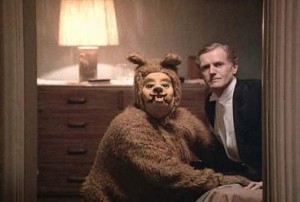
Back at an earlier stage of our evolution, stories were created by our ancestors as coded warnings. Ogres, monstrous wolves, malevolent royalty and all manner of other folk tale nightmares functioned as stand-ins for more generalised vices like temptation, misplaced desire, gluttony or carelessness. That style of storytelling persists today, except in a more highly developed form.
Zombies represent the bad parts of ourselves we thought we’d overcome but are always down there looking to regain control. Vampires are stand-ins for the way strangers and desire prey on us. Ever wonder why so many aliens are based around insects? They’re manifestations of the guilt we feel every time we swat a fly, step on a cockroach or destroy a spider web.
And if all movie monsters are metaphors, The Shining works the dynamic as well as any. Stephen King’s novel was written as a metaphor for the alcoholism he was battling at the time, which is why the Overlook hotel unlocked Jack Torrance’s violence and resentment by driving him back to the same drink that caused him to beat his son Danny before the book began.
Unable to write or hold a conventional job, and with his status as a father in doubt, Torrance is forced into exile at the Overlook where he has plenty of time to stew. The harbingers to his ultimate breakdown come in the outbursts directed at his wife (a suitably jittery Shelley Duvall) when she questions him about his work or parenting, no matter how innocently.
In conclusion, if we learn a lesson from The Shining, it’s that we have to adapt with the world in order to survive. That, and don’t build things on an ancient Indian burial ground.
An extended cut of The Shining is showing at the Islington Screen on the Green, the Cineworld at West India Quay and in cinemas throughout London. A documentary about its making, Room 237, is also showing elsewhere in London.